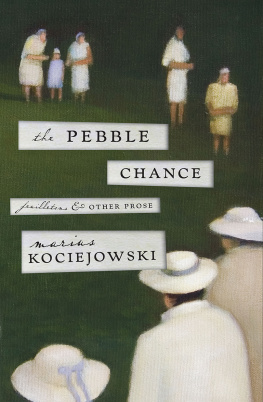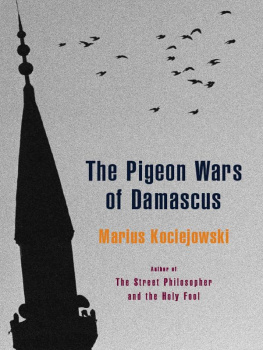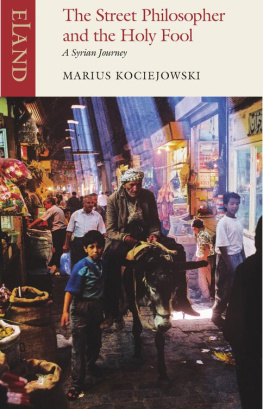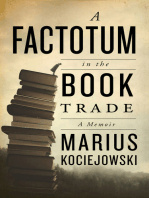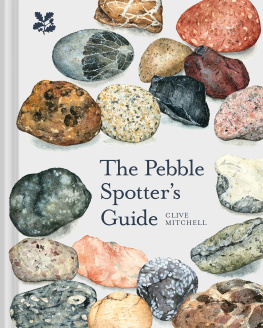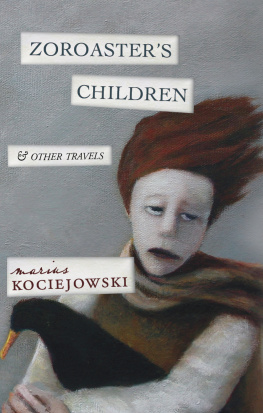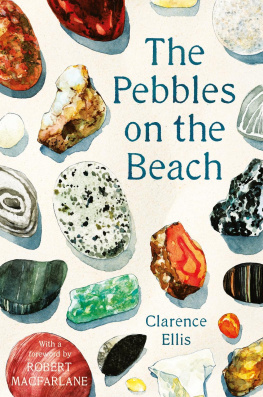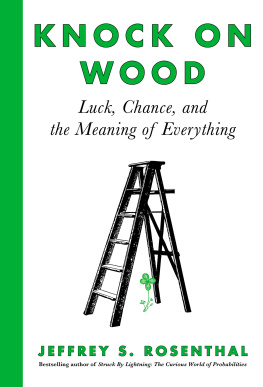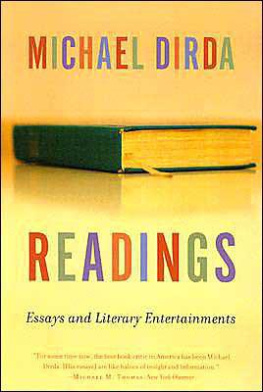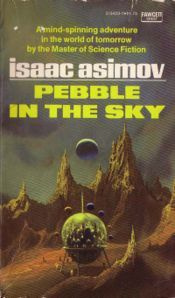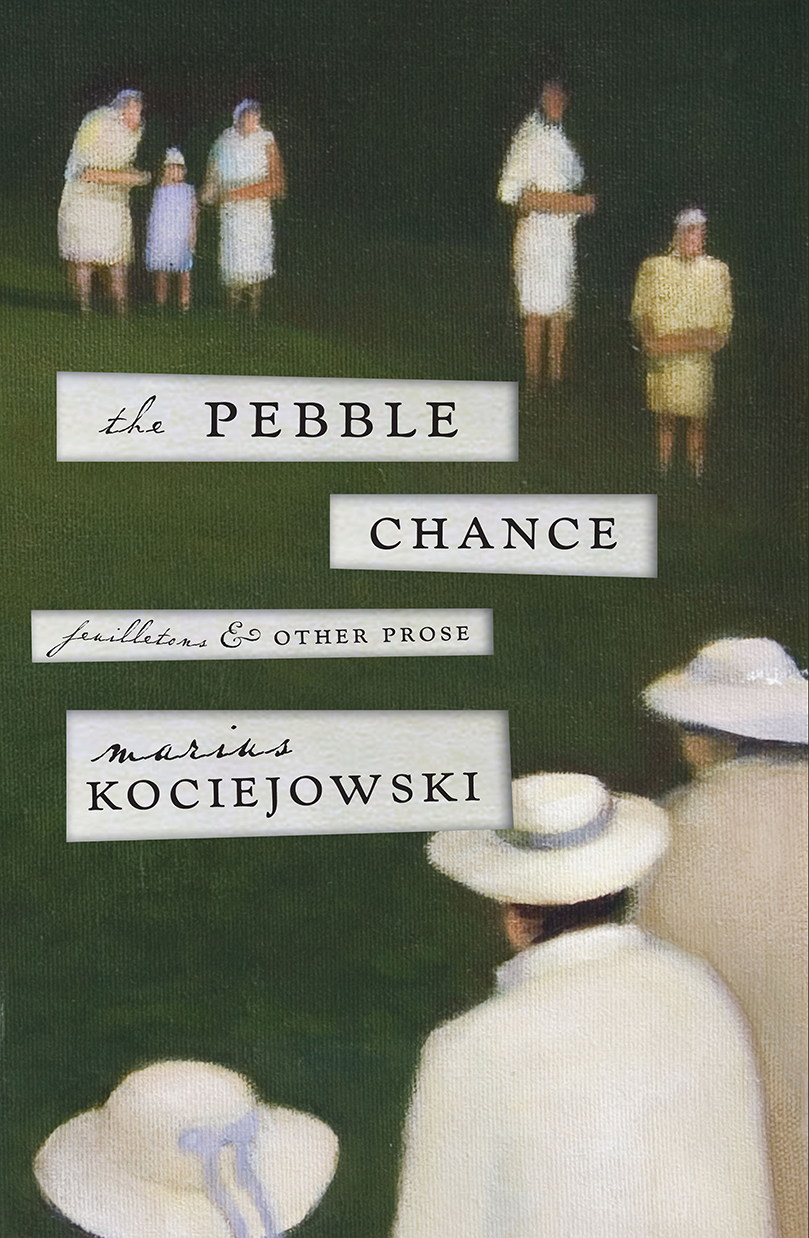The Pebble Chance
Feuilletons & Other Prose
Marius Kociejowski
biblioasis
windsor, ontario
Copyright Marius Kociejowski, 2014
All rights reserved. No part of this publication may be reproduced or transmitted in any form or by any means, electronic or mechanical, including photocopying, recording, or any information storage and retrieval system, without permission in writing from the publisher or a licence from The Canadian Copyright Licensing Agency (Access Copyright). For an Access Copyright licence, visit www.accesscopyright.ca or call toll free to 1-800-893-5777.
first edition
Library and Archives Canada Cataloguing in Publication
Kociejowski, Marius, author
The pebble chance : feuilletons and other prose / Marius
Kociejowski.
Essays.
Issued in print and electronic formats.
ISBN 978-1-927428-77-1 (pbk.).--ISBN 978-1-927428-78-8 (epub)
I. Title.
PS8571.O64P42 2014 C814.54 C2014-902927-6
C2014-902926-8
Edited by Dan Wells
Typeset by Chris Andrechek
Cover Designed by Kate Hargreaves



B iblioasis acknowledges the ongoing financial support of the Government of Canada through the Canada Council for the Arts, Canadian Heritage, the Canada Book Fund; and the Government of Ontario through the Ontario Arts Council.
for
Eric Ormsby
&
Norm Sibum
Authors Note
T hese essays and feuilletons are presented in no particular order, and, barring the musical rhythm I hope they will together create, they have no connecting theme other than the majority of them are rooted in personal experience. They are, if anything, insufficiently disparate in subject and tone. MK
A Factotum in the Book Trade
Y ears ago, in my v ery early twenties, I was an employee in a shop that sold wicker baskets and bamboo furniture. I was known to my friends as the Wicker King. The manageress who was in her thirties, who had as many syllables in her name as mine, would describe to me, in detail, her sexual escapades. She did so, I think, only because she was bored. At the close of each week, our pay in hand, away from the shop owners eyes, we would demolish a basket, usually by placing it upside down on the floor and jumping on it, she one week, me the next. She put a run through her stocking once. At first we giggled maniacally but then, as habit evolved into ritual, we became more solemn. It was a quick cure for tdium vit and, besides, theres nothing sweeter than the smell of newly broken basket. Many years later, in another country, I got to know of a couple of booksellers who, for similar reasons, would take a volume of some author loathsome to them both, J.B. Priestley, for example, and use it to play a game of bounce, the object of the exercise being not so different from skipping stones or what here is most charmingly called ducks and drakes.
So why begin with instances that are in themselves morally objectionable? Its to do with work, I suppose, not just its ritual absurdities, so often incomprehensible to people on the outside, but also the daily struggle to get through to the other side of it, the long hours we endure for just a bubble of free time. We become oddities even to ourselves. Apparently, in some guide to bookshops in London, there is a photo of me putting books on the shelves outside the shop where I now work, Peter Ellis in Cecil Court, London. The man who informed me of this is a philosopher of some note. I have yet to investigate whether its true. Im not even sure I want to. Maybe its not me but Peter Ellis himself and there has been a case of mistaken identity. It has happened before. Suppose it really is me, though, would this be anybody Id care to recognise? Am I not, after all, somebody else? Only rarely is the daily hat one wears the hat one imagines for oneself. This said, the greater part of my working life has been spent in the antiquarian book trade, and now, as I go into decline, I am being asked to come up with some account of that time. Im stumped. Once I asked a nomad in the mountains south of Isfahan what it was like to be a nomad. Where are you from? he asked me. London, I replied. Ive never met anyone from there in these hills before, he said. I did not make further enquiries. So here I am, face to face with myself, as one who knows my own terrain perhaps a little too well to be able to describe my journey through it, similarly nonplussed. Surely a man with a pickaxe is more the stuff of literature than he who sells it, unless, of course, the latter falls prey to the former. Many booksellers are, after all, born murderees.
I am not, in the fullest sense, a bookseller, which is to say an independent one, although the opportunities for me to become one did arise. The choice was between selling books and writing them. I couldnt do both. One would not allow for the other. I am not so sure I can consider myself a bookshop assistant either, and maybe this is because I am deluded enough to believe that a man clutching a rare volume is somehow, if only for minutes at a time, bestowed with a pedigree. The book world is, however, a world in which one might keep ones face. There are less dignified ways to survive. A factotum is how Bernard Stone described me once, and so, all right, I will accept this limited, rather limiting, definition of myself.
Before I continue, I have a confession to make: I know far less about books than I did, say, even a decade ago, which would suggest my own basket is beginning to unravel. I need to be jumped upon, bagged up, all evidence of me quickly removed. Very soon I shall know nothing at all, not even the issue points for the 1923 Hogarth Press edition of The Waste Land . The other day I got Samuel Johnson and Ben Jonson in a muddle.
So what brought me to this bookish state?
Well, books actually. When I was a child, in Canada, Id go to the annual church sale in the village and always be the first at the book table. In truth, there was nobody with whom to compete so I could go through the volumes at leisure. (It was not like a certain annual jumble sale here in London where a regular figure, his head the shape of a bullet, would sway in a circular fashion in front of the book table, arms akimbo, his elbows jutting into the ribs of anyone nearby and with what seemed to be a third arm, for such was the perfection of his technique, put his finds in a pile. Once he carried off an entire set of Anthony Powells A Dance to the Music of Time. Maybe they were not first editions, but Im almost certain they were. A kind of halo hovered over them.) But, to go back to my childhood, a separation has to be made here between the books my parents gave me or the magical Rupert Bear annuals my grandmother sent me from England and the books which I grabbed from the church sale table. The buyer and the reader were not necessarily the same creature. I would go home with an armload of books, collectively priced at little more than what Id have to pay for an ice cream, and which were chosen not so much for their contents as for their tactile qualities. Among them, I remember, were a fine copy of W.J. Ghents The Road to Oregon , which I suspect was unreadable, and a ragged copy of some Christian missionarys account of going to the South Seas and putting clothes on naked savages. Alohaekaunei with her bare breasts suddenly, by the grace of God, became Gladys in a frock. Despite the musty tinge of Protestantism that clung to almost every volume, those books seemed to have value. Although I could not have said so at the time, there must have already resided in me some element of the mercantile.

